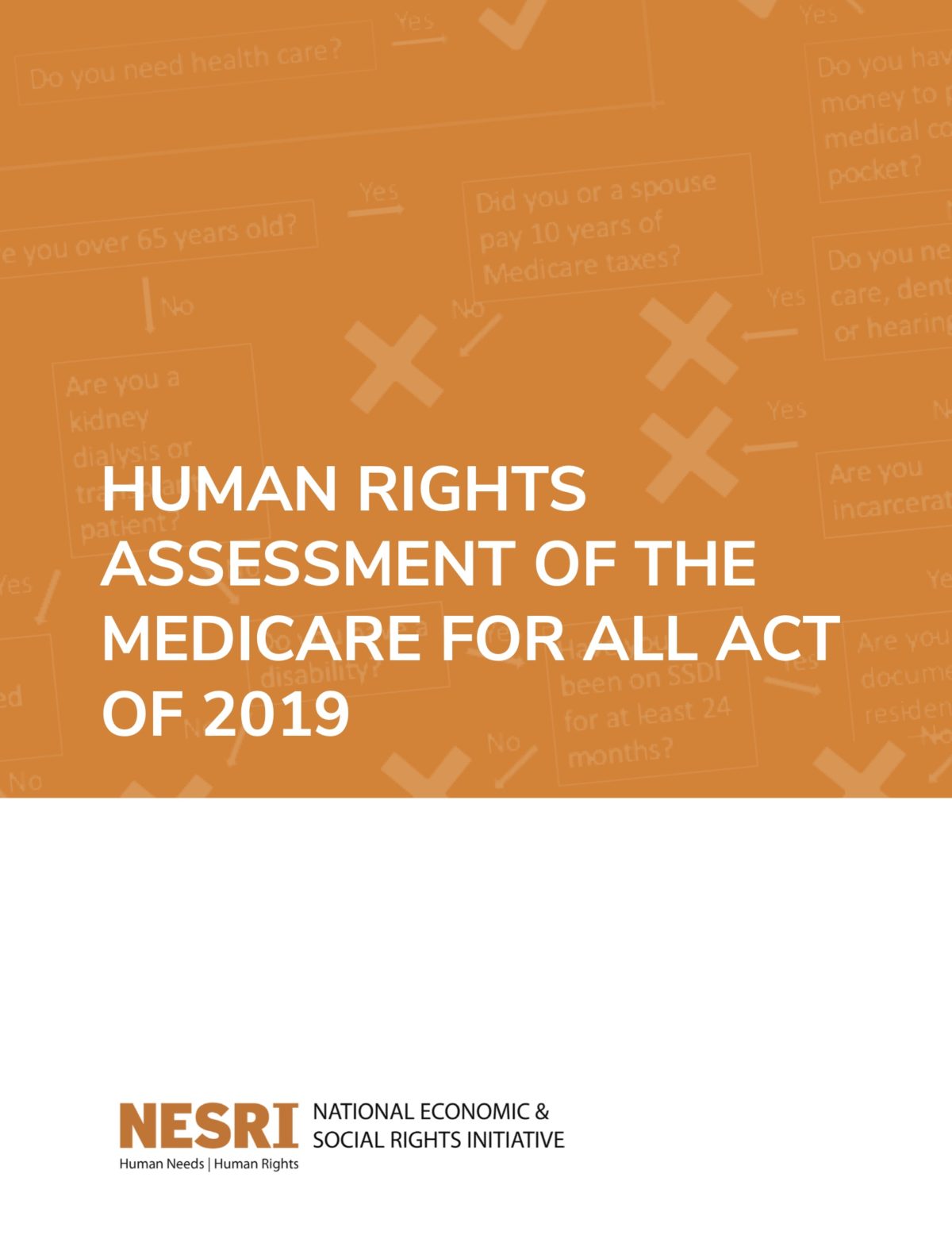New Release: Human Rights Assessment of Medicare for All Act of 2019

FOR IMMEDIATE RELEASE
Contact: Ben Palmquist
NESRI Releases Human Rights Assessment of Medicare for All Act of 2019
The Act Would Set a New Standard for Guaranteeing Health Care as a Human Right in the United States, the Assessment Finds
NEW YORK, New York – February 27 – The National Economic and Social Rights Initiative (NESRI) has released a comprehensive assessment of the Medicare for All Act of 2019 (HR 1384), which Congresswoman Pramila Jayapal introduced in the U.S. House earlier today. The assessment evaluates extent to which the Act meets human rights standards, which require universal access to care, equitable financing and delivery, and democratic accountability. The Act, reports NESRI, stands up extremely well.
“The Medicare for All Act of 2019 sets a new standard for what it means to guarantee health care as a human right in the United States,” says NESRI Executive Director Cathy Albisa. “And it charts out a clear course to get there.”
The Medicare for All Act arrives at a key moment in national health care politics as the House considers multiple bills and Senators announcing presidential runs are making health care a top priority. In public debates, two different visions for health care reform have emerged.
The first vision is more modest. Sometimes dubbed “Medicare for More,” it would retain the current set of public and private insurance programs, but tweak them by allowing more people to “buy into” Medicare (or perhaps Medicaid) by paying premiums. Proponents point out that this approach would meet relatively little political opposition. (Rather than opposing a public buy-in option, the insurance, hospital, and drug industries are in fact actively lobbying for it).
The second vision is far more ambitious. It would unify all existing public and private programs in a single “Medicare for All” system that would be financed publicly through taxes. Proponents argue that although this approach will meet fierce political opposition, getting insurance companies out of the health care system and restricting the power of hospital and drug companies over life-and-death decisions is the only way to rein in spiraling costs and truly guarantee comprehensive care to all.
NESRI Campaign Manager Ben Palmquist, the lead author of the assessment, agrees.
“Recognizing health care as human right requires our government to guarantee comprehensive care to everyone, no exceptions,” he says. “But as we found in this assessment, private insurance is no guarantee of care. Tens of millions of people who have insurance don’t have critical coverage like dental and long-term care. Tens of millions of people are being hit with impossible medical bills, pushed into debt, or forced into choices between paying for medicine or paying for food, rent, and heating. Tens of millions of people are having to pay growing premiums, deductibles, and other costs that they simply can’t afford. We need to be really clear about all the many ways in which the insurance system is failing people. A public option isn’t going to fix all that.”
In contrast, NESRI’s assessment finds, the Medicare for All Act would guarantee universal access to all medically necessary care. It would eliminate insurance premiums, deductibles, and medical bills, which place heavy costs on small employers and poor, middle class, and sick people. Instead, the Act would finance the entire health care system through taxes. Although the bill does not include a detailed tax financing plan, NESRI found it that it creates the possibility to redistribute health care costs to the wealthiest individuals and corporations while simultaneously guaranteeing everyone protection from ever having to pay more than they can afford.
Palmquist recognizes that the politics of health care are not easy, but says that the human rights framework helps clarify the goals of the health care system, what decisions need to be made, and who should be making those decisions.
“What’s really at stake,” he says, “is how we answer the questions ‘Who gets what care?’ and ‘Who pays what?’ We need a public, democratic debate about how we, as a country, want to answer those questions. Right now, those decisions are being made by private insurance, hospital, and drug companies, and they are deciding to limit our coverage, deny our claims, limit what doctors we can see, and drive up prices. It’s anti-democratic and its denying us our fundamental rights. We need to bring these questions out into the light and hold Members of Congress accountable to answering them. If they’re going to say that ‘health care is a human right,’ we need to be really clear about what that means.”
Resources:
- NESRI’s human rights assessment of the Medicare for All Act of 2019
- NESRI explainer: “What is the Human Right to Health and Health Care?”
About the National Economic and Social Rights Initiative:
In partnership with communities, NESRI works to build a broad movement for economic & social rights, including health, housing, education and work with dignity. Based on the principle that fundamental human needs create human rights obligations on the part of government and the private sector, NESRI advocates for public policies that guarantee the universal and equitable fulfillment of these rights in the United States.
###
